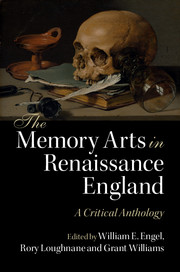Book contents
- Frontmatter
- Dedication
- Contents
- List of figures
- Acknowledgements
- A note on abbreviations
- Introduction
- PART I The art of memory
- Introduction to Part I
- I.1 Stephen Hawes, The Pastime of Pleasure (1509)
- I.2 [Laurence Andrewe], The Mirror of the World (1527)
- I.3 Peter of Ravenna, The Phoenix (1548)
- I.4 Guglielmo Gratarolo, The Castle of Memory (1562)
- I.5 Hugh Plat, The Jewel House of Art and Nature (1594)
- I.6 William Basse, A Help to Memory and Discourse (1620)
- I.7 John Willis, The Art of Memory (1621, 1661)
- I.8 Henry Herdson, Ars memoriae; the Art of Memory Made Plain (1651)
- I.9 Richard Saunders, Art of Memory (1671)
- I.10 Marius D'Assigny, The Art of Memory (1697)
- PART II Rhetoric and poetics
- PART III Education and science
- PART IV History and philosophy
- PART V Religion and devotion
- PART VI Literature
- Index
- References
I.5 - Hugh Plat, The Jewel House of Art and Nature (1594)
from PART I - The art of memory
Published online by Cambridge University Press: 05 August 2016
- Frontmatter
- Dedication
- Contents
- List of figures
- Acknowledgements
- A note on abbreviations
- Introduction
- PART I The art of memory
- Introduction to Part I
- I.1 Stephen Hawes, The Pastime of Pleasure (1509)
- I.2 [Laurence Andrewe], The Mirror of the World (1527)
- I.3 Peter of Ravenna, The Phoenix (1548)
- I.4 Guglielmo Gratarolo, The Castle of Memory (1562)
- I.5 Hugh Plat, The Jewel House of Art and Nature (1594)
- I.6 William Basse, A Help to Memory and Discourse (1620)
- I.7 John Willis, The Art of Memory (1621, 1661)
- I.8 Henry Herdson, Ars memoriae; the Art of Memory Made Plain (1651)
- I.9 Richard Saunders, Art of Memory (1671)
- I.10 Marius D'Assigny, The Art of Memory (1697)
- PART II Rhetoric and poetics
- PART III Education and science
- PART IV History and philosophy
- PART V Religion and devotion
- PART VI Literature
- Index
- References
Summary
About the author
Hugh Plat (1552–1608) was a miscellaneous writer knighted by James I for his efforts to increase agricultural productivity. Among his ‘inventions’ was the production of cheap fuel by pressing coal and clay or manure into combustible balls.
About the text
This collection of domestic wisdom gives easy-to-follow recipes for a range of useful products and ingenious processes. It is divided into five tracts, the last of which contains a chapter on the art of memory, treated as yet another expeditious scheme, coming after chapters on ‘How to melt down the filings of iron nails’ and ‘How to put several liquors or Wines in one Glass, without mixing’.
The arts of memory
Plat addresses the art of memory popularised by Alexander Dickson (1558–1604), a follower of Giordano Bruno who was in England 1583–5 (the interlocutor ‘Dicsono’ appears as a disciple in Bruno's Italian dialogues). Although Plat finds this method apt for discharging one's errands and recalling table-talk aphorisms, he disdains Dickson's taking money for this simple system of associative connections. He grants its efficacy for winning at cards, but concludes the chapter in the vein of a ‘coney-catching’ pamphlet, exposing the grift. Elsewhere in Jewel House he recounts a method for cheating at cards using ‘A perspective ring that will discover all the cards that are near him that wears it on his finger’ (C3v). Notwithstanding his wariness of Dickson's aims, Plat still advocates memory techniques when judiciously applied; for example, in ‘A ready way for children to learn their ABC’: ‘Cause four large dice of bone or wood to be made and upon every square one of the small letters of the cross row to be graven, but in some bigger shape, and the child used to playing with them, and being always told what letter chanceth, will soon gain his Alphabet as it were by the way of sport or pastime’ (H3r).
Textual notes
Hugh Plat, The Jewell House of Art and Nature (London, 1594), N1r–N3r.
The Jewell House of Art and Nature
The Art of Memory which Master Dickson the Scot did teach of late years in England, and whereof he hath written a figurative and obscure treatise, set down briefly and in plain terms according to his own demonstration, with the special uses thereof.
- Type
- Chapter
- Information
- The Memory Arts in Renaissance EnglandA Critical Anthology, pp. 65 - 69Publisher: Cambridge University PressPrint publication year: 2016



